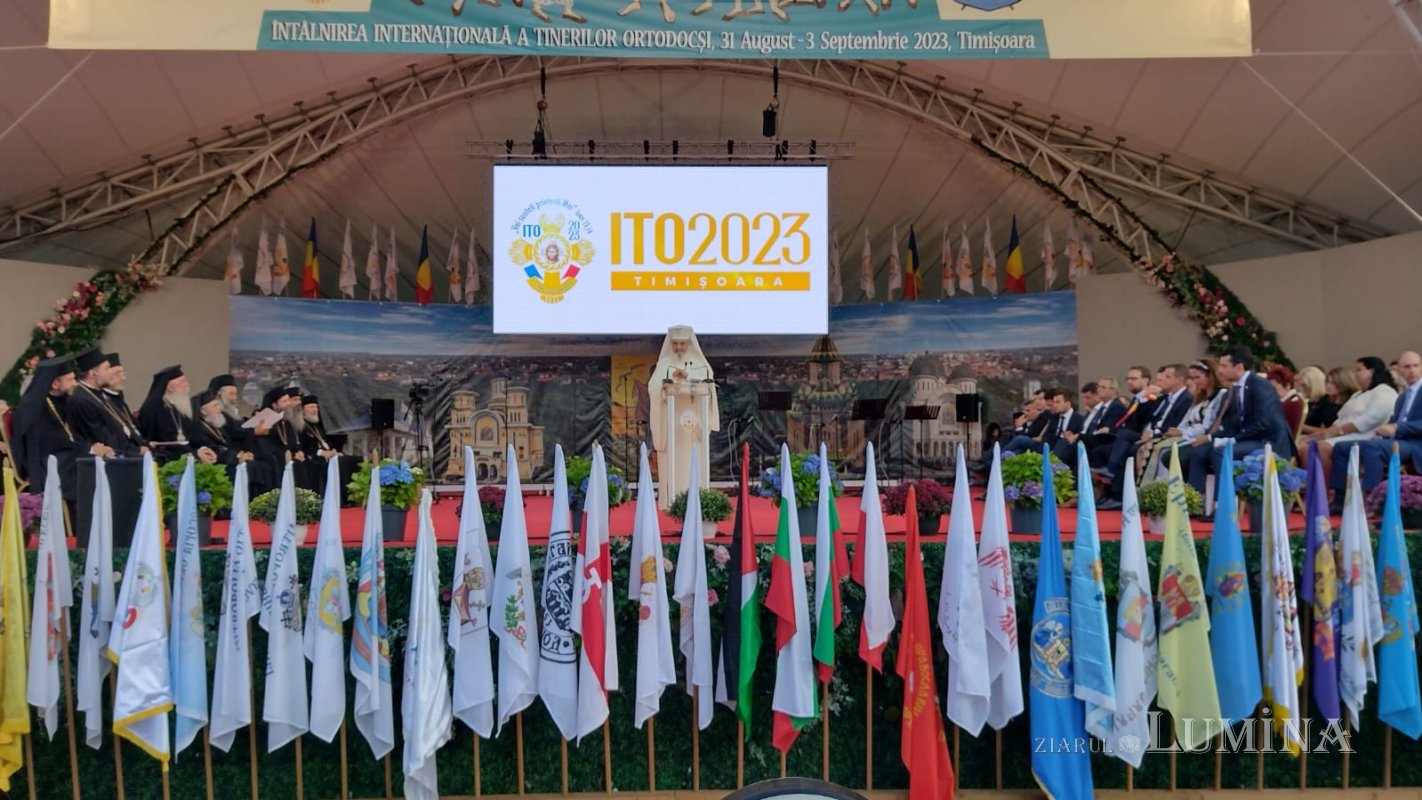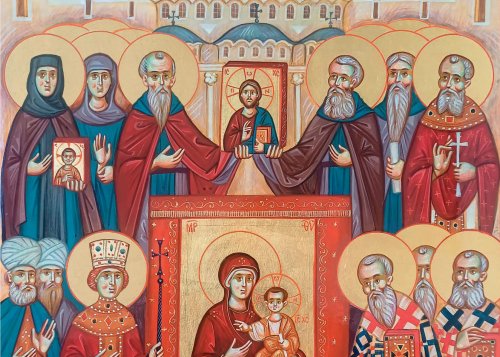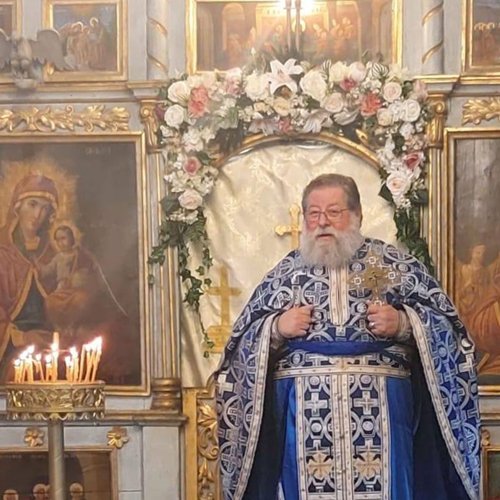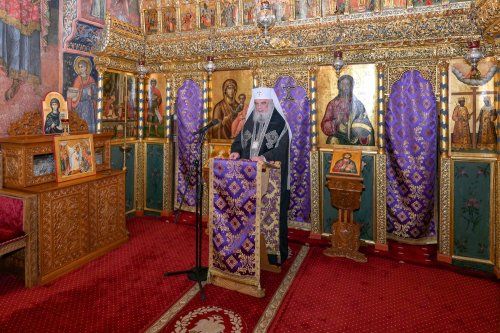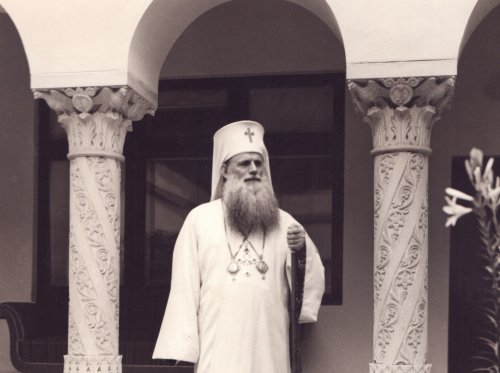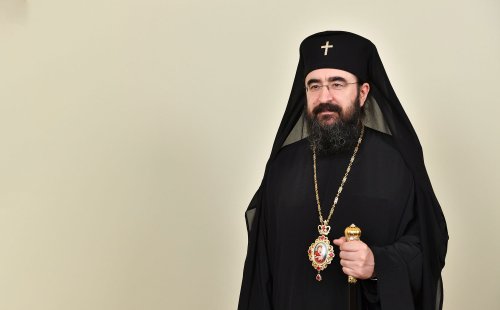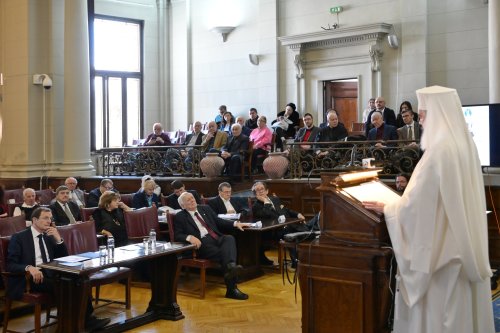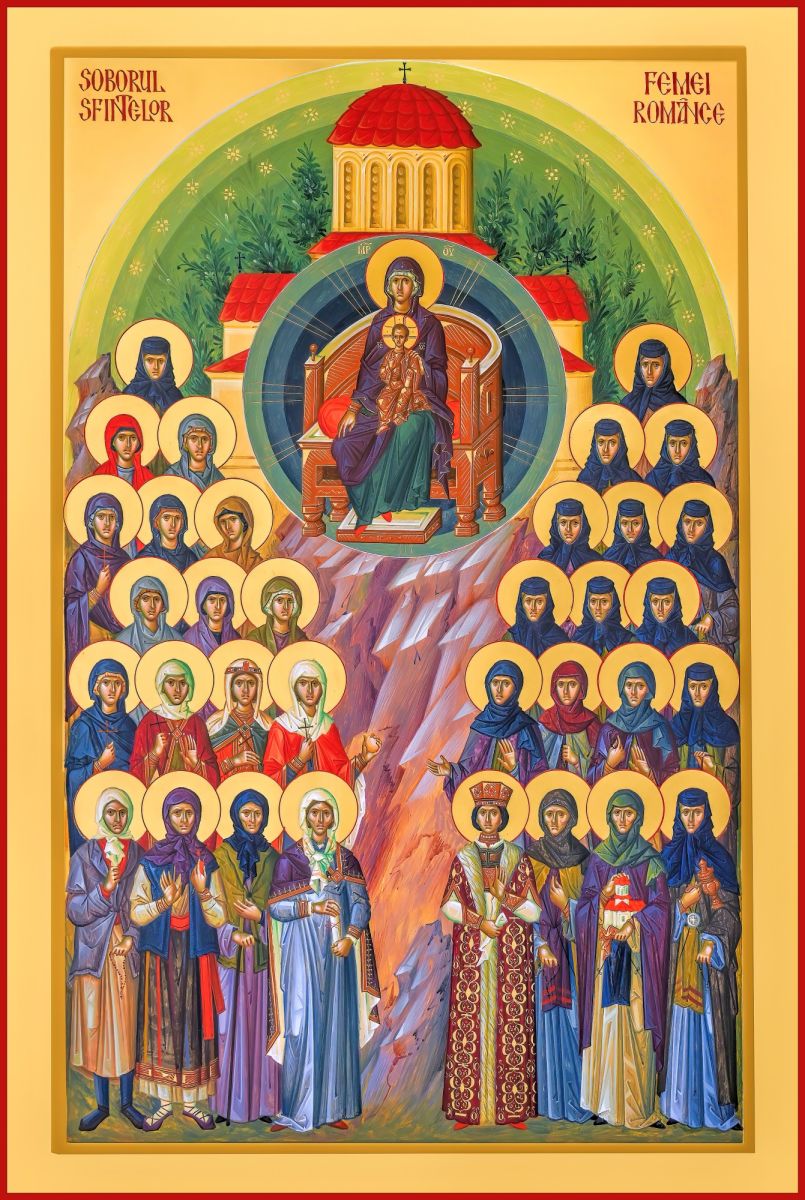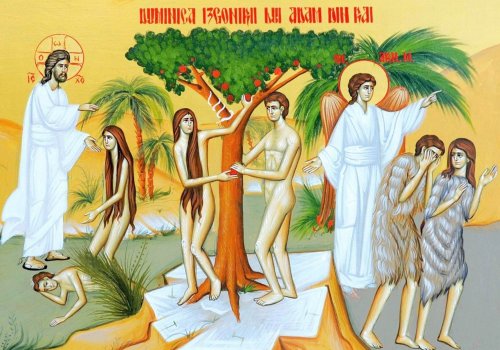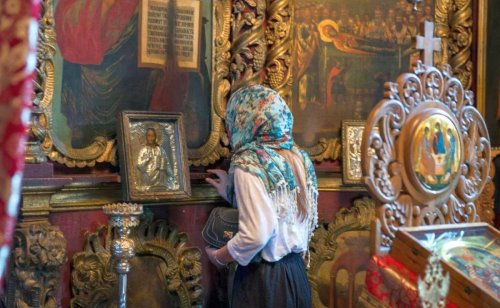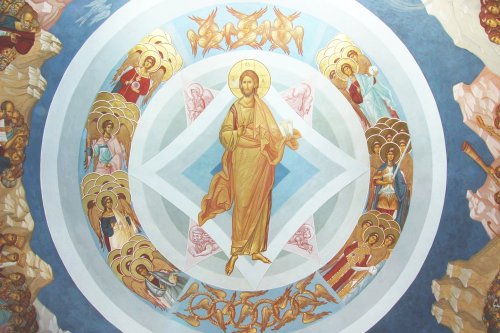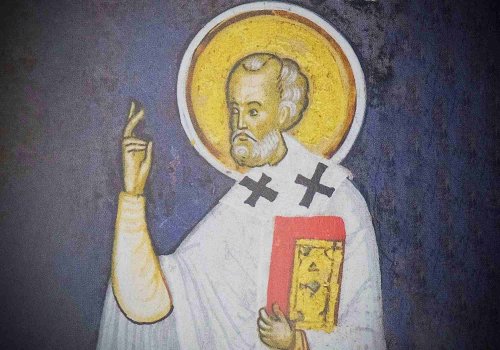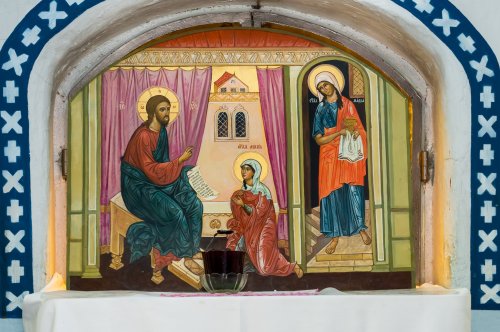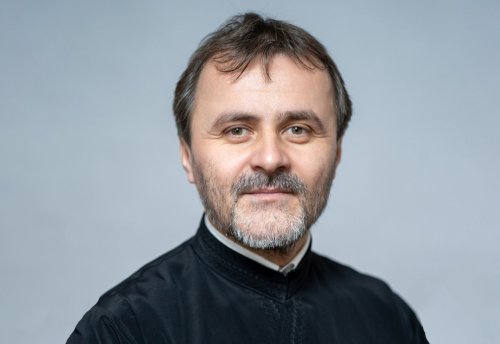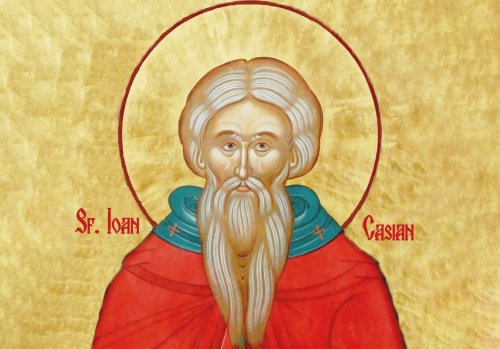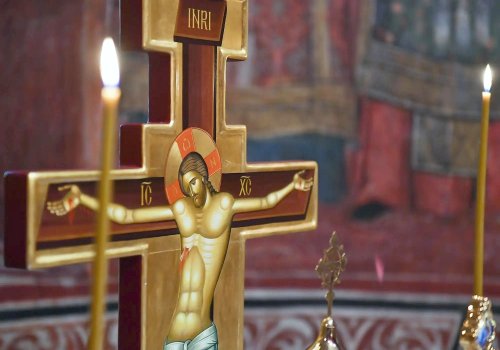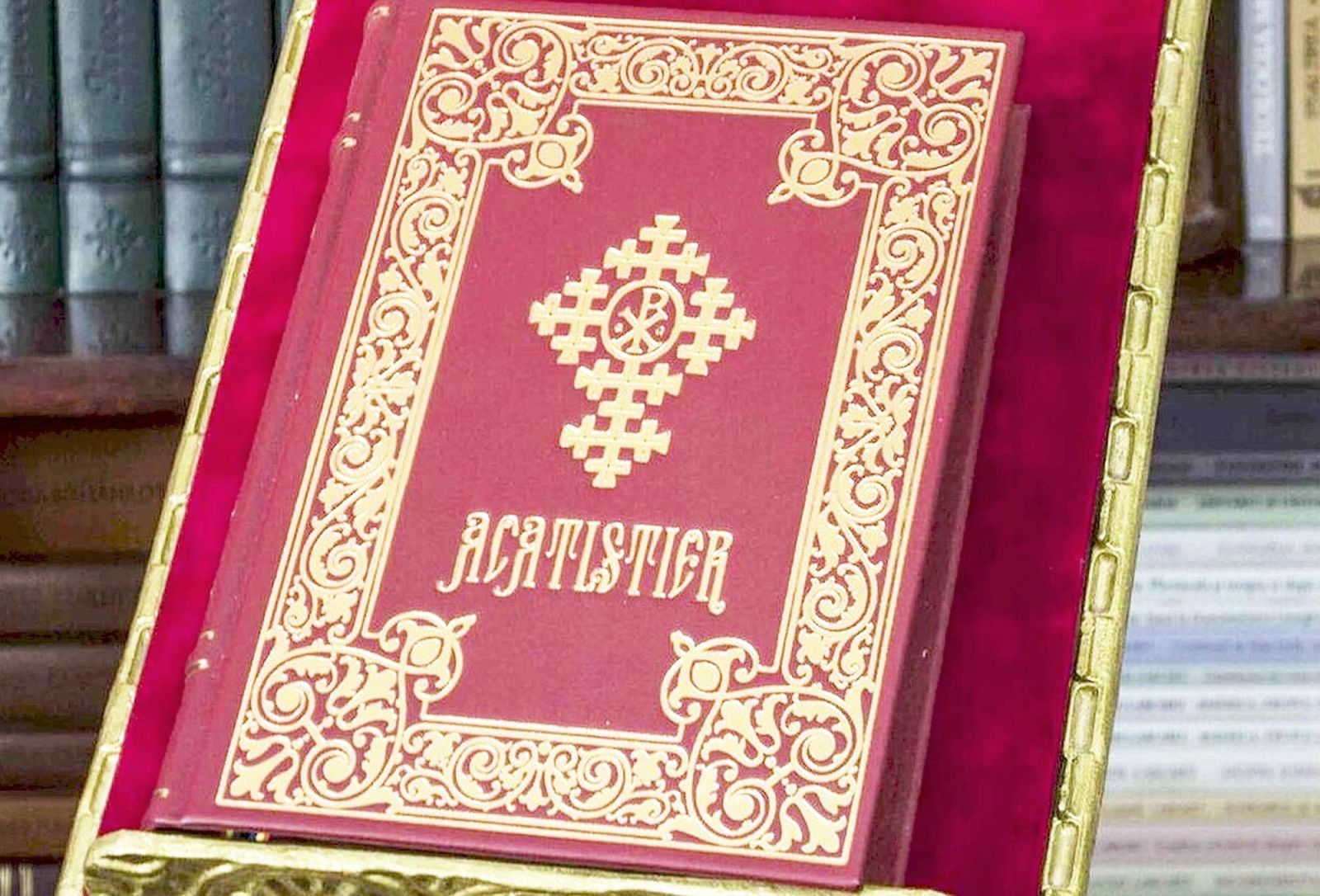Pastorala la Duminica Ortodoxiei Preacuvioși și Preacucernici Părinți, Iubiți frați și surori în Domnul, În lumina duhovnicească a începutului Sfântului și Marelui Post, Biserica ne pun
Prietenia lui Dumnezeu cu oamenii este începutul fericirii veşnice
Tema principală a acestei Întâlniri Internaţionale a Tinerilor Ortodocşi (ITO) de la Timişoara o constituie cuvintele Domnului Iisus Hristos adresate ucenicilor Săi, „Voi sunteţi prietenii Mei...” (Ioan 15, 14).
I. Prietenia în antichitate şi în Sfânta Scriptură:
Prietenia este, încă din antichitatea greco-romană, o virtute mult preţuită şi lăudată de Platon, Aristotel, Plutarh, Seneca, Cicero ş.a. Aceasta presupune relaţii între două sau mai multe persoane, bazate pe reciprocitate, deschidere şi egalitate1. În prietenie se exprimă şi se cultivă relaţii de deschidere (dialog), încredere, recunoaştere a valorilor, fidelitate şi susţinere reciprocă2.
În Vechiul Testament, Cartea Înţelepciunea lui Isus Sirah (6, 14-16) precizează: „Prietenul credincios este acoperământ tare; şi cel ce l-a aflat pe el aflat-a comoară. Cu prietenul credincios nimic nu se poate asemăna şi nu este măsură a bunătăţii lui. Prietenul credincios este leacul vieţii şi cei ce se tem de Domnul îl vor afla pe el”. Aşadar, textul acesta arată clar că numai cei ce se tem de Dumnezeu sunt capabili de adevărată prietenie şi numai aceia sunt prieteni cu adevărat3.
De asemenea, Cartea Pildelor laudă prietenia adevărată astfel: „Prietenul iubeşte în orice vreme, iar în nenorocire el este ca un frate” (Pilde 17, 17). Aceeaşi carte avertizează, însă, că „sunt prieteni aducători de nenorocire, dar este şi câte un prieten mai apropiat decât un frate” (Pilde 18, 24).
În mod deosebit, Sfânta Scriptură scoate în evidenţă prietenia lui Dumnezeu cu Avraam, numit prieten sau iubit al lui Dumnezeu (cf. Isaia 41, 8 şi Iacov 2, 23) şi „Părinte al multor popoare” (cf. Facere 17, 4-6). Dumnezeu îl cheamă pe Avraam la misiune sfântă, mai precis, îi cere să părăsească țara sa natală (Urul Caldeii) și să meargă într-o ţară îndepărtată, necunoscută lui (Canaan), pe care Dumnezeu o va da lui moştenire (cf. Facere 12, 1). Prin credinţă smerită, Avraam răspunde chemării lui Dumnezeu.
Mai târziu, Dumnezeu îi cere lui Avraam să-I aducă jertfă pe Isaac, unicul său fiu (cf. Facere 22, 1-2). Avraam împlineşte porunca, dar, în locul lui Isaac, îngerul Domnului îi cere să aducă jertfă un miel din apropiere (cf. Facere 22, 11-13). Atunci, Isaac prefigura pe Iisus Hristos, Cel ce Se va aduce pe Sine jertfă pe lemnul Crucii. Pentru credinţa sa în Dumnezeu şi pentru smerita sa ascultare de El, Avraam a fost considerat „iubitul” sau „prietenul lui Dumnezeu” (cf. Isaia 41, 8). Acest titlu reprezintă cea mai mare onoare pentru un om în Vechiul Testament. Mai târziu, „prieten al lui Dumnezeu” a fost numit şi Moise, precum şi unii profeţi ai Vechiului Testament4.
Titlul de „prieten al lui Dumnezeu” atribuit lui Avraam apare o singură dată în Noul Testament, şi anume în Epistola Sobornicească a Sfântului Apostol Iacov (2, 23).5
Sfinţii Părinţi ai Bisericii consideră că binecuvântarea lui Dumnezeu dăruită lui Avraam de a fi prieten al Său şi numele dat lui de „Părinte al multor neamuri” (Facere 12, 3 şi 17, 4-6) a fost transferată de la Avraam la ucenicii lui Hristos, pe care Iisus Hristos îi numeşte „prietenii Mei” şi îi „rânduieşte să aducă roadă” (cf. Ioan 15, 14-16), deoarece îi va trimite în ţări îndepărtate şi la neamuri sau popoare diferite (cf. Matei 28, 19), pentru a binevesti acestora credinţa în Iisus Hristos. Astfel, şi Apostolii lui Hristos devin „părinţi ai multor popoare”.
Subliniind acest adevăr, Sfântul Chiril al Alexandriei († 444), în Comentariul său la Evanghelia Sfântului Ioan, scrie: „S-a spus către maica iudeilor, adică Sinagoga, prin glasul Psalmistului: «În locul părinţilor tăi, s-au născut ţie fii» (Psalmi 44, 19). Căci, deşi sunt fii ai Sinagogii iudeilor, dumnezeieştii ucenici (care prin moravuri erau înscrişi între mozaici) s-au făcut părinţi, luând locul lui Avraam, adică s-au făcut începutul unui neam duhovnicesc. De aceea, s-au hirotonit începători în toată lumea, slujind Evangheliei lui Hristos, precum acela (Avraam) a fost început al lui Isaac, care era chip al lui Hristos”6.
Părintele Dumitru Stăniloae precizează că „Hristos îi numeşte pe ucenicii Săi şi pe urmaşii acestora «prieteni» pentru că sunt în stare să împlinească porunca Lui de a-L iubi (pe El) şi de a se iubi unii pe alţii. De aceea, le-a şi descoperit cea mai înaltă voinţă a Tatălui: aceea de a-L iubi şi de a se iubi unii pe alţii. Dar Tatăl a şi dat oamenilor această putere, întrucât L-a făcut pe Fiul Său Unul dintre oameni. Acesta, ca om, fiind în stare să-L iubească în grad superior pe Dumnezeu, le dă această putere şi oamenilor. (...). Este cea mai înaltă cinste pentru oameni ca Dumnezeu să-i facă prietenii Săi şi să le dea puterea şi curajul să-L iubească (pe Hristos) ca pe Fratele şi Prietenul lor”7.
Referitor la calitatea de a fi „prieten al lui Hristos”, Sfântul Chiril al Alexandriei spune: „Ia seama că această demnitate e mai presus de înseși hotarele firii omenești (...) Nu este egal creatul cu Creatorul niciodată, ci Dumnezeu stăpâneşte peste toţi şi conduce operele Sale”8.
Adică, această calitate sau demnitate de a fi „prieteni ai lui Hristos” se oferă ucenicilor Săi, ca un adaos sau un dar deosebit9. Iar părintele Stăniloae arată valoarea eternă a acestei prietenii a oamenilor cu Hristos-Dumnezeu: „Oamenii sunt ridicaţi la prietenia şi frăţia cu Fiul lui Dumnezeu, făcut om pentru vecie, ceea ce înseamnă înaintarea lor veşnică în bunătatea dumnezeiască infinită”10.
În concluzie, remarcăm că, potrivit Sfintei Scripturi şi Sfinţilor Părinţi ai Bisericii, prietenia lui Dumnezeu cu oamenii şi prietenia oamenilor cu Dumnezeu au ca scop principal şi permanent dobândirea vieţii veşnice şi a slavei din Împărăţia lui Dumnezeu, potrivit făgăduinţei Domnului Iisus Hristos: „Mă duc (la cer) să vă găsesc loc (…), ca să fiţi şi voi unde sunt Eu” (Ioan 14, 2-3).
II. Viaţa Bisericii şi viaţa cotidiană sunt mediul în care se cultivă prietenia credincioşilor cu Hristos Dumnezeu, cu Sfinţii Lui şi cu oamenii aflaţi în nevoi.
Tinerii sunt binecuvântare şi bucurie pentru familie, Biserică şi popor. De aceea, Biserica este chemată să transmită tinerilor iubirea lui Hristos pentru copii şi tineri şi să-i ajute să devină prieteni ai lui Hristos şi prieteni ai tuturor oamenilor, copii, tineri, adulţi şi vârstnici, care au nevoie de prezenţa şi acţiunea tinerilor credincioşi şi prietenoşi, rugători şi ajutători.
Prietenia tinerilor ortodocşi cu Domnul Iisus Hristos se cultivă, în primul rând, prin rugăciune personală şi comunitară, prin participarea la Sfânta Liturghie şi la alte slujbe ale Bisericii, deoarece, aşa cum spune Sfântul Isaac Sirul, „dragostea curată se naşte din rugăciune”. Mai precis, prin rugăciune, sufletul creştinului se umple de iubirea smerită şi milostivă a lui Hristos, iar mâinile creştinului rugător pot deveni „mâinile iubirii milostive a lui Hristos” arătată oamenilor aflaţi în nevoi spirituale şi materiale.
Numeroasele activităţi desfășurate până acum de tinerii ortodocşi arată că ei cunosc şi trăiesc în mare măsură legătura sfântă care există între Liturghie şi filantropie, între rugăciune şi acţiune creştină, deoarece, aşa cum spunea părintele Stăniloae, „Sfintele Taine ale Bisericii sunt multipla dăruire a lui Hristos către oameni”.
Iar Sfântul Ioan Gură de Aur ne îndeamnă să vedem prezenţa tainică a lui Hristos în aproapele nostru suferind, sărac sau bolnav, trist sau descurajat, şi să îi răspundem cu iubire smerită şi milostivă, aceasta fiind singurul criteriu al judecăţii sau evaluării finale a vieţii omului pe pământ (cf. Matei 25, 31-46).
În concluzie, reţinem că prietenia omului cu Dumnezeu, prin rugăciune, şi cu semenii, prin fapte bune, este lumina cea mai sigură a vieţii, lumina pe care o va purta fiecare om în sufletul său la orice vârstă, în orice loc, în timp şi în eternitate.
Pentru bucuria comuniunii eclesiale, mulţumim Înaltpreasfinţitului Părinte Ioan, Mitropolitul Banatului, tuturor organizatorilor acestei Întâlniri Internaţionale a Tinerilor Ortodocşi de la Timişoara, precum şi tuturor participanţilor, clerici, mireni şi mai ales tineri din Biserica noastră şi din alte Biserici Ortodoxe Surori.
Ne rugăm Preasfintei Treimi, Maicii Domnului şi tuturor sfinţilor să ne ajute tuturor să devenim cât mai mult „prieteni ai lui Hristos”, pentru a rămâne totdeauna tineri bucuroşi în Domnul, potrivit îndemnului apostolic: „Bucuraţi-vă pururea în Domnul! Şi iarăşi zic: Bucuraţi-vă!” (Filipeni 4, 4).
Cu părinteşti binecuvântări,
† Daniel
Patriarhul Bisericii Ortodoxe Române
Mesaj rostit cu prilejul Întâlnirii Internaţionale a Tineretului Ortodox (ITO), Timișoara, 31 august.
Note:
1. Michael Theobald, art. „Freundschaft”, in „Lexikon für Theologie und Kirche” vierter Band, Verlag Herder in Freiburg im Breisgau, 2017, col. 132.
2. Wolfgang Krone, art. „Freundschaft”, in „Lexikon für Theologie und Kirche”, col. 134.
3. Vezi φίλος, φίλη, φιλἱα (friendship) în „Theological Dictionary of the New Testament”, Edited by Gerhard Friedrich, Volume IX, Michigan, 1974, p. 157.
4. Vezi Theological Dictionary of the New Testament, ed. cit., p. 168, nota 184.
5. Cf. Theological Dictionary of the New Testament, ed. cit., p. 167.
6. Sfântul Chiril, Arhiepiscopul Alexandriei, Comentariu la Evanghelia Sfântului Ioan, tomul 3 (cărţile IX-XII), traducere şi note de preotul academician Dumitru Stăniloae, Ed. BASILICA, 2022, p. 299.
7. Cf. Pr. Dumitru Stăniloae în: Sfântul Chiril, Arhiepiscopul Alexandriei, Comentariu la Evanghelia Sfântului Ioan, n. 307, p. 300.
8. Sfântul Chiril, Arhiepiscopul Alexandriei, Comentariu la Evanghelia Sfântului Ioan, pp. 294-295.
9. Cf. Sfântul Chiril, Arhiepiscopul Alexandriei, Comentariu la Evanghelia Sfântului Ioan, p. 296.
10. Cf. Pr. Dumitru Stăniloae în: Sfântul Chiril, Arhiepiscopul Alexandriei, Comentariu la Evanghelia Sfântului Ioan, nota 302, pp. 297-298.
***
God's friendship with humans is the beginning of eternal joy
The central theme of this International Meeting of Orthodox Youth (ITO) in Timisoara is comprised of the words of the Lord Jesus Christ addressed to His disciples, "You are My friends" (John 15: 14).
I. Friendship in antiquity and in the Holy Scriptures
Since Greco-Roman antiquity, friendship was a virtue highly valued and praised by Plato, Aristotle, Plutarch, Seneca, Cicero, etc. It implies relationships between two or more persons based on reciprocity, openness and equality1. Friendship expresses and cultivates relationships of openness (dialogue), trust, recognition of values, fidelity and mutual support2.
In the Old Testament, the Book of the Wisdom of Sirach (6:14-16) notes: "Faithful friends are a sturdy shelter; whoever finds one has found a treasure. Faithful friends are beyond price; no amount can balance their worth. Faithful friends are life-saving medicine, and those who fear the Lord will find them." Therefore, this text clearly indicates that only those who fear God are capable of true friendship and only those can be genuine friends3.
Likewise, the Book of Proverbs praises true friendship as follows: "A friend loves at all times, a brother is born for a time of adversity" (Proverbs 17:17). The same book warns, however, that "One who has unreliable friends soon comes to ruin, but there is a friend who sticks closer than a brother" (Proverbs 18:24).
In particular, the Holy Scripture highlights God's friendship with Abraham, called God’s friend or beloved (Isaiah 41:8, James 2:23) and "Father of many nations" (Genesis 17:4-6). God calls Abraham to a holy mission, more precisely, He asks him to leave his native land (Ur of the Chaldees) and go to a distant land, unknown to him (Canaan), which God would give him as an inheritance (Genesis 12:1). Through humble faith, Abraham responds to God's call.
Later, God asks Abraham to sacrifice Isaac, his only son (Genesis 22:1-2). Abraham fulfils the commandment, but instead of Isaac, the angel of the Lord asks him to sacrifice a nearby ram (Genesis 22:11-13). Isaac foreshadowed Jesus Christ, the One who would sacrifice Himself on the wood of the Cross. For his faith and his humble obedience to God, Abraham was considered “God's beloved or friend" (Isaiah 41:8). This title represents the greatest honour for a man in the Old Testament. Later, Moses was also called "a friend of God," as well as some other prophets of the Old Testament4.
The title "friend of God" attributed to Abraham appears only once in the New Testament, namely in the General Epistle of the Holy Apostle James (2:23)5.
The Holy Church Fathers consider that the blessing of God granted to Abraham to be called His friend and his name meaning "Father of many nations" (Genesis 12:3, 17:4-6) was transferred from Abraham to the disciples of Christ, whom Jesus Christ called "friends" and appointed them "to bear fruit" (John 15:14-16), because He would send them to distant countries and to different nations or peoples (Matthew 28:19) in order to preach the faith in Jesus Christ. Thus, Christ's apostles have also become "fathers of many nations."
Highlighting this truth in his Commentary on the Gospel of St. John, St. Cyril of Alexandria († 444) writes: "Therefore it has been said to the mother of the Jews, I mean the synagogue, by the voice of the Psalmist: Instead of fathers thy sons have been born. (Psalms 45:19). For the inspired disciples are truly sons of the synagogue of the Jews, for they were nourished up in the Mosaic usages. They became fathers, holding the position of Abraham, and were the beginning of the spiritual race, and for this reason were ordained as rulers, offering up as a sacrifice the Gospel of Christ in all the world, as did Abraham Isaac as a type of Christ.”6
Father Dumitru Stăniloae notes that "Christ calls His disciples and their descendants "friends" because they are able to fulfil His commandment to love Him and to love one another. That is why He revealed to them the highest will of the Father: that of loving Him and loving one another. But the Father also gave people this power, since He made His Son one of us humans. As a man, being able to love God to a higher degree, He gives this power to humans as well. (...). It is the highest honour for humans that God should make them His friends and give them strength and courage to love Him (Christ) as their Brother and Friend (our emphasis).”7
Regarding the quality of being a "friend of Christ", Saint Cyril of Alexandria states: "For see how the reward surpasses the very limits of the nature of man. For the work produced is not on an equality with its producer; and how could it be? But God, Who is over all, will hold sway over and direct His own works."8
This quality or dignity of being "friends of Christ" is therefore offered to His disciples, as conferment or special gift. Father Stăniloae points to the eternal value of this friendship of humans with Christ-God, "People are elevated to friendship and brotherhood with the Son of God, made man for eternity, which implies their eternal advancement in infinite divine goodness."9
In conclusion, we note that according to the Holy Scriptures and the Holy Fathers of the Church, God's friendship with people and their friendship with God have as their main and permanent goal the acquisition of eternal life and glory in the Kingdom of God, according to the promise of the Lord Jesus Christ: "I am going (to heaven) to prepare a place for you (...), so that you also may be where I am" (John 14:2-3).
II. The life of the Church and everyday life are the environment in which the friendship of believers with Christ God, with His Saints and with people in need is cultivated
Young people are a blessing and joy for the family, the Church and the people. Therefore, the Church is called to convey to young people Christ's love for children and youth and to help them become friends of Christ and friends of everyone, children, young people, adults and elderly, who need the presence and actions of faithful, friendly, prayerful and helpful young people.
The friendship of the Orthodox youth with the Lord Jesus Christ is cultivated, first of all, through personal and communal prayer, through participation in the Divine Liturgy and other services of the Church, because, as Saint Isaac the Syrian says, "pure love is born from prayer". More precisely, through prayer, the Christian's soul is filled with the humble and merciful love of Christ, and the hands of the praying Christian can become "the hands of the merciful love of Christ" shown to people in spiritual and material needs.
The numerous activities carried out so far by the Orthodox youth demonstrate that they understand and live to a large extent the holy connection that exists between Liturgy and philanthropy, between prayer and Christian action, because, as Father Stăniloae said, "The Holy Mysteries of the Church are the multiple offering of Christ to people."
Moreover, Saint John Chrysostom urges us to see the mystical presence of Christ in our suffering neighbour, who is poor or sick, sad or discouraged, and to respond with humble and merciful love, as this is the only criterion for the final judgment or evaluation of human life on earth (Matthew 25:31-46).
In conclusion, we note that man's friendship with God, through prayer, and with his fellow people, through good deeds, is the surest light of life, the light that everyone will bear in their souls at any age, in any place, in time and in eternity.
For the joy of ecclesial communion, we thank His Eminence Metropolitan Ioan of Banat, all the organisers of this International Meeting of Orthodox Youth in Timisoara, as well as all the participants, clergy, laity and especially the young people from our Church and from other Sister Orthodox Churches.
We pray to the Most Holy Trinity, the Mother of God and all the Saints to help us all to become as much as possible "friends of Christ", to always remain young and joyful in the Lord, according to the apostolic exhortation: "Rejoice in the Lord always. I will say it again: Rejoice!" (Philippians 4:4).
With paternal blessings,
† Daniel
Patriarch of the Romanian Orthodox Church
Message by His Beatitude DANIEL, Patriarch of the Romanian Orthodox Church, at the International Meeting of Orthodox Youth (ITO), Timișoara, August 31 – September 3, 2023.
1 Michael Theobald, art. „Freundschaft”, in „Lexikon für Theologie und Kirche” vierter Band, Verlag Herder in Freiburg im Breisgau, 2017, col. 132.
2 Wolfgang Krone, art. „Freundschaft”, in „Lexikon für Theologie und Kirche”, col. 134.
3 See φίλος, φίλη, φιλἱα (friendship) in „Theological Dictionary of the New Testament”, Edited by Gerhard Friedrich, Volume IX, Michigan, 1974, p. 157.
4 See Theological Dictionary of the New Testament, p. 168.
5 Theological Dictionary of the New Testament, p. 167.
6 St Cyril of Alexandria, Commentary on John, translated by T. Randell, Book 10, vol. 2, https://tinyurl.com/4cf28fze.
7 Fr. Dumitru Stăniloae in Sfântul Chiril, Arhiepiscopul Alexandriei, Comentariu la Evanghelia Sfântului Ioan, [St Cyril of Alexandria, Commentary on the Gospel of John], Bucharest 2022, note 307, p. 300.
8 St Cyril of Alexandria, Commentary on John, translated by T. Randell, Book 10, vol. 2, https://tinyurl.com/4cf28fze.
9 Fr. Dumitru Stăniloae in Sfântul Chiril, Arhiepiscopul Alexandriei, Comentariu la Evanghelia Sfântului Ioan, [St Cyril of Alexandria, Commentary on the Gospel of John], Bucharest 2022, note 302 pp. 297-298.







